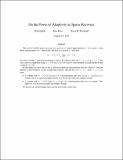On the Power of Adaptivity in Sparse Recovery
Author(s)
Indyk, Piotr; Price, Eric C.; Woodruff, David P.
DownloadIndyk_On the power of adaptivity.pdf (217.1Kb)
OPEN_ACCESS_POLICY
Open Access Policy
Creative Commons Attribution-Noncommercial-Share Alike
Terms of use
Metadata
Show full item recordAbstract
The goal of (stable) sparse recovery is to recover a k-sparse approximation x* of a vector x from linear measurements of x. Specifically, the goal is to recover x* such that ∥x-x*∥[subscript p] ≤ C min, k-sparse x, ∥x-x'∥[subscript q] for some constant C and norm parameters p and q. It is known that, for p = q=l or p = q = 2, this task can be accomplished using m = O(k log(n/k)) non-adaptive measurements [3] and that this bound is tight [9], [12], [28]. In this paper we show that if one is allowed to perform measurements that are adaptive, then the number of measurements can be considerably reduced. Specifically, for C = 1+∈ and p = q = 2 we show · A scheme with m= O(1/∈ log log (n∈/k)) measurements that uses O(log* k · log log(n∈/k)) rounds. This is a significant improvement over the best possible non-adaptive bound. · A scheme with m = O(1/∈k log(k/∈) + k log(n/k)) measurements that uses two rounds. This improves over the best possible non-adaptive bound. To the best of our knowledge, these are the first results of this type.
Date issued
2011-12Department
Massachusetts Institute of Technology. Computer Science and Artificial Intelligence Laboratory; Massachusetts Institute of Technology. Department of Electrical Engineering and Computer ScienceJournal
IEEE 52nd Annual Symposium on Foundations of Computer Science (FOCS), 2011
Publisher
Institute of Electrical and Electronics Engineers (IEEE)
Citation
Indyk, Piotr, Eric Price, and David P. Woodruff. “On the Power of Adaptivity in Sparse Recovery.” IEEE 52nd Annual Symposium on Foundations of Computer Science (FOCS), 2011. 285–294.
Version: Author's final manuscript
ISBN
978-1-4577-1843-4
ISSN
0272-5428